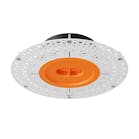Building Technologies Office funds small business R&D building efficiency projects
This week, Secretary of Energy Jennifer M. Granholm announced $54 million in funding for Small Business Innovation Research (SBIR) and Small Business Technology Transfer (STTR) research and development projects. As a part of this announcement, the Building Technologies Office (BTO) will invest $3.6 million in 21 projects across 14 states.
Read more about the recipients of BTO’s SBIR/STTR Phase I grants.
The SBIR/STTR Program helps small businesses conduct research and development (R&D) for projects with the potential for commercialization. Through a competitive awards-based program, SBIR and STTR enable small businesses to explore their technological potential and provide the incentive to profit from its commercialization while stimulating technological progress. SBIR/STTR-funded projects are one way DOE supports the development of a clean energy workforce and engages all levels of the energy economy to combat the climate crisis. These latest BTO-funded projects will focus on modeling, data, and analytics; lighting R&D, energy management for indoor agriculture; healthy, efficient buildings; advanced building technologies; heat exchangers; and thermal energy storage technologies.
Topic 12b: Building Energy Modeling
- OptiMiser of Denver, Colorado, will improve its existing home energy use models by connecting them to the U.S. Department of Energy’s EnergyPlus simulation software, improving the software’s ability to identify customers who would benefit from load shifting programs and energy-efficiency upgrades.
- Community Energy Labs of Portland, Oregon, will test the effectiveness of a hybrid manual parameter collection (MPC) and sensor system to collect energy efficiency data in academic buildings.
- ENERlite Consulting of Sacramento, California, will develop a multistage calibration tool that integrates manual input with automated calibration to produce more relevant and realistic models of building energy use.
Topic 12c: Solid-State Lighting Technologies
- Glint Photonics of Burlingame, California, will develop new solid-state lighting products that provide superior lighting quality and improved efficiency at prices competitive with existing lighting technology.
- OLEDWorks of Rochester, New York, will develop new OLED automotive taillights composed of multiple stacked layers of red and white OLEDs. This technology can also be applied to indoor lighting to provide greater efficiency, a broader intensity range, and the ability to communicate safety information.
- Monde Wireless of Goleta, California, will develop novel materials for use in direct emission amber nitride LEDs. If successful, this work could remove a major roadblock to the production of amber nitride LEDs, which have the potential to greatly increase the efficiency of LED lighting.
Topic 12d: Advanced Building Control Systems for Controlled Environment Agriculture (CEA)
- Energy Americas, LLC of Boonville, Missouri, will develop a smart climate control system to maintain a stable, high-quality environment for indoor poultry farms. If successful, this project will allow farmers to raise chickens in a clean and healthy environment while reducing their heating fuel consumption by approximately 50%.
Topic 12e.1: Healthy, Efficient Residential Buildings
- PD3 Technologies Inc. of Huntington Beach, California, will develop a low-cost, self-powered ductless ventilator that can be installed in existing homes and networked with other devices to provide automated climate control without consuming grid energy.
- Ventamatic of Mineral Wells, Texas, will develop a low-cost airflow sensor that can be integrated with residential ventilation fans to provide automatic climate control.
Topic 12e.2: Healthy, Efficient Commercial Buildings
- Burch Energy Services LLC of Lafayette, Oregon, will develop a Clean Air Management System (CAMS) that uses indoor air quality sensors and region-specific public health information to adjust buildings’ climate control to improve both efficiency and occupant health.
- Molecule Works Inc. of Richland, Washington will develop a new membrane-based air filter with effectiveness equal to or better than existing HEPA filters and an estimated five-year lifetime.
Topic 13b: Joint Topic: Advanced Building Construction Technologies – Low-Cost, High-R Insulation
- Optowares Inc. of Woburn, Massachusetts, will demonstrate the feasibility of ambient pressure-dried poly-DCPD aerogel blankets as an effective, low-cost form of thermal and acoustic insulation.
- Amsen Technologies LLC of Tucson, Arizona, will develop a novel production process for low-cost, highly efficient blanket aerogel insulation.
Topic 13c: Joint Topic: Advanced Building Construction Technologies - Advanced Building Equipment Technologies
- IBACOS Inc. of Pittsburgh, Pennsylvania, will validate the technical feasibility of an automatic modulating air distribution manifold for room-level HVAC zoning in single-family homes. If successful, this system will allow homeowners to improve HVAC efficiency at much lower cost than existing zoning systems.
Topic 20c: Joint Topic: Cable Materials and Applications - Nonmetallic Heat Exchangers (CABLE)
- Technology Assessment & Transfer Inc. of Annapolis, Maryland, will develop and demonstrate lightweight, compact additive manufactured alumina ceramic heat exchangers with high thermal conductivity, dimensional stability, low thermal expansion, and resistance to corrosion.
- Energy Wall of Lancaster, Pennsylvania, will develop a new class of ceramic polymer hybrid microchannel heat exchangers that can potentially improve the efficiency of heat pumps by more than 60%.
- Triton Systems Inc. of Chelmsford, Massachusetts, will develop a plastic heat exchanger with novel microscale geometry and manufacturing method to improve efficiency of commercial and residential HVAC systems.
Topic 20d: Joint Topic: Cable Materials and Applications - Ice-Storage and Other Thermal Storage-Related Systems (CABLE)
- Mainstream Engineering Corporation of Rockledge, Florida, will construct and characterize an inexpensive water-based phase-change material heat exchanger that can be easily and affordably integrated with residential and commercial HVAC systems.
Contact:
U.S. Department of Energy Office of Energy Efficiency and Renewable Energy
Building Technologies Office
Email:
Visit EERE web site contacts page





